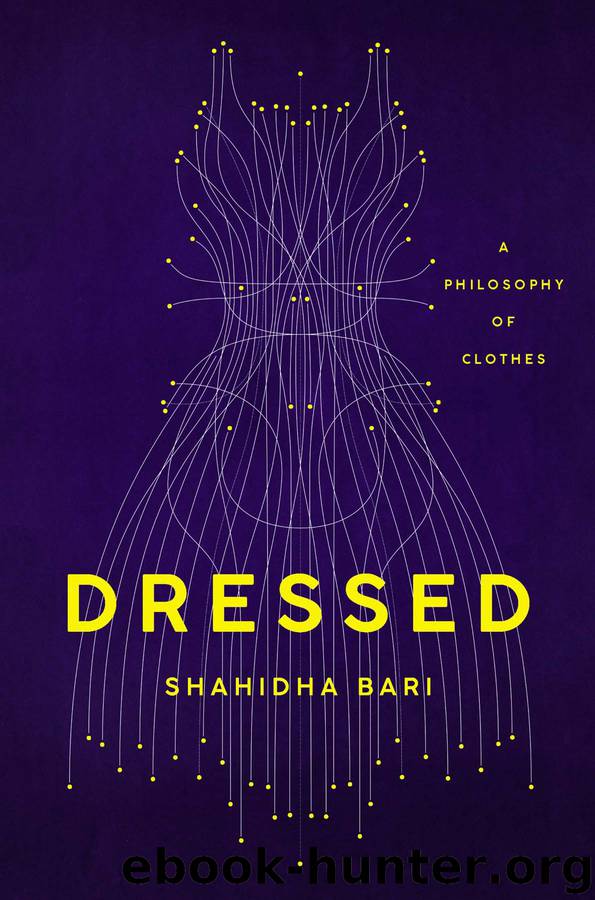Dressed by Shahidha Bari

Author:Shahidha Bari
Language: eng
Format: epub
Publisher: Basic Books
Published: 2020-03-16T16:00:00+00:00
Hobbes, later in the century, would describe the nation as a body, the king at its head. Shakespeare’s Menenius has something similar in mind when he describes with withering condescension the “greatness” of the toes, those lowliest citizens, sent out first into battle and among whose ranks the most blood is shed. The “First Citizen” is deliberately nameless, only one of so many in a faceless crowd, but this crowd also votes with their feet. They move en masse, their allegiances shifting to and from Coriolanus in the course of the play, their collective will as fickle as fate, transforming the city around them. The citizens remind Coriolanus of how power is felled by the body politic and how the “great toes” can pull the rug out from under those who claim to rule as readily as they give them footing. They are this multitude, relegated to the margins, and they might at any moment rise to their feet. They are only the footnote to a history that is conventionally told through kings and colonels but which is meaningless without them.
Workers might be the footnote to this history, but they possess a revolutionary power too. Marx understood this with piercing clarity, imagining how the working class might challenge the order of their larger society from their position on the sidelines. From the margins, you might summon a disruptive power. In some small way, the humble footnote, too, possesses this power, threatening to derail the way we see things. When we read heavily annotated works, a niggling irritation tugs our reading down and away. Nicholson Baker toys with this idea of disruption in The Mezzanine, his comically digressive novel about a shoelace, a shoe, and a footnote.16 “My left shoelace had snapped before lunch,” explains the narrator, deadpan, providing the story’s sole plot. The novel extends into excruciatingly painful detail, meandering, but always eventually returning to the blank fact of the broken lace. Is it an event of no consequence or every consequence? It’s hard to tell. The protagonist cannot decide either. Indecision is, for him, a crisis of almost existential proportions.
But Baker’s narrator only suffers from an extreme version of what is, in reality, the everyday dilemma of judgment which all of us wrestle with all the time: the difficulty of discerning the substantial from the superficial. How do we ever work out what to attend to at any given moment? We make choices. We sift the data from the digression or detach the body of text from the foot of a page. We examine the face instead of staring at the shoe. But the things that we dismiss as inessential prove themselves, so often, to be indispensable too. Both footnotes and feet share a curious banality, an ordinariness that is ultimately revealed to be integral. Baker’s own footnotes to the novel grow increasingly rambling, as his protagonist’s story spirals out of control. He offers up a footnote on footnotes themselves, advising against digressions, even as his own prose strays wildly.
Download
This site does not store any files on its server. We only index and link to content provided by other sites. Please contact the content providers to delete copyright contents if any and email us, we'll remove relevant links or contents immediately.
| Advertising | Annuals |
| Book Design | Branding & Logo Design |
| Fashion Design | Illustration |
| Science Illustration |
Wonder by R.J. Palacio(8580)
Mastering Adobe Animate 2023 - Third Edition by Joseph Labrecque(3843)
Unlabel: Selling You Without Selling Out by Marc Ecko(3663)
Ogilvy on Advertising by David Ogilvy(3622)
Hidden Persuasion: 33 psychological influence techniques in advertising by Marc Andrews & Matthijs van Leeuwen & Rick van Baaren(3565)
Drawing Cutting Edge Anatomy by Christopher Hart(3529)
The Pixar Touch by David A. Price(3439)
POP by Steven Heller(3361)
The Code Book by Simon Singh(3189)
The Art of War Visualized by Jessica Hagy(3008)
Slugfest by Reed Tucker(3004)
The Curated Closet by Anuschka Rees(2974)
Rapid Viz: A New Method for the Rapid Visualization of Ideas by Kurt Hanks & Larry Belliston(2906)
Stacked Decks by The Rotenberg Collection(2883)
365 Days of Wonder by R.J. Palacio(2838)
The Wardrobe Wakeup by Lois Joy Johnson(2783)
Keep Going by Austin Kleon(2763)
Tattoo Art by Doralba Picerno(2668)
Tell Me More by Kelly Corrigan(2652)
